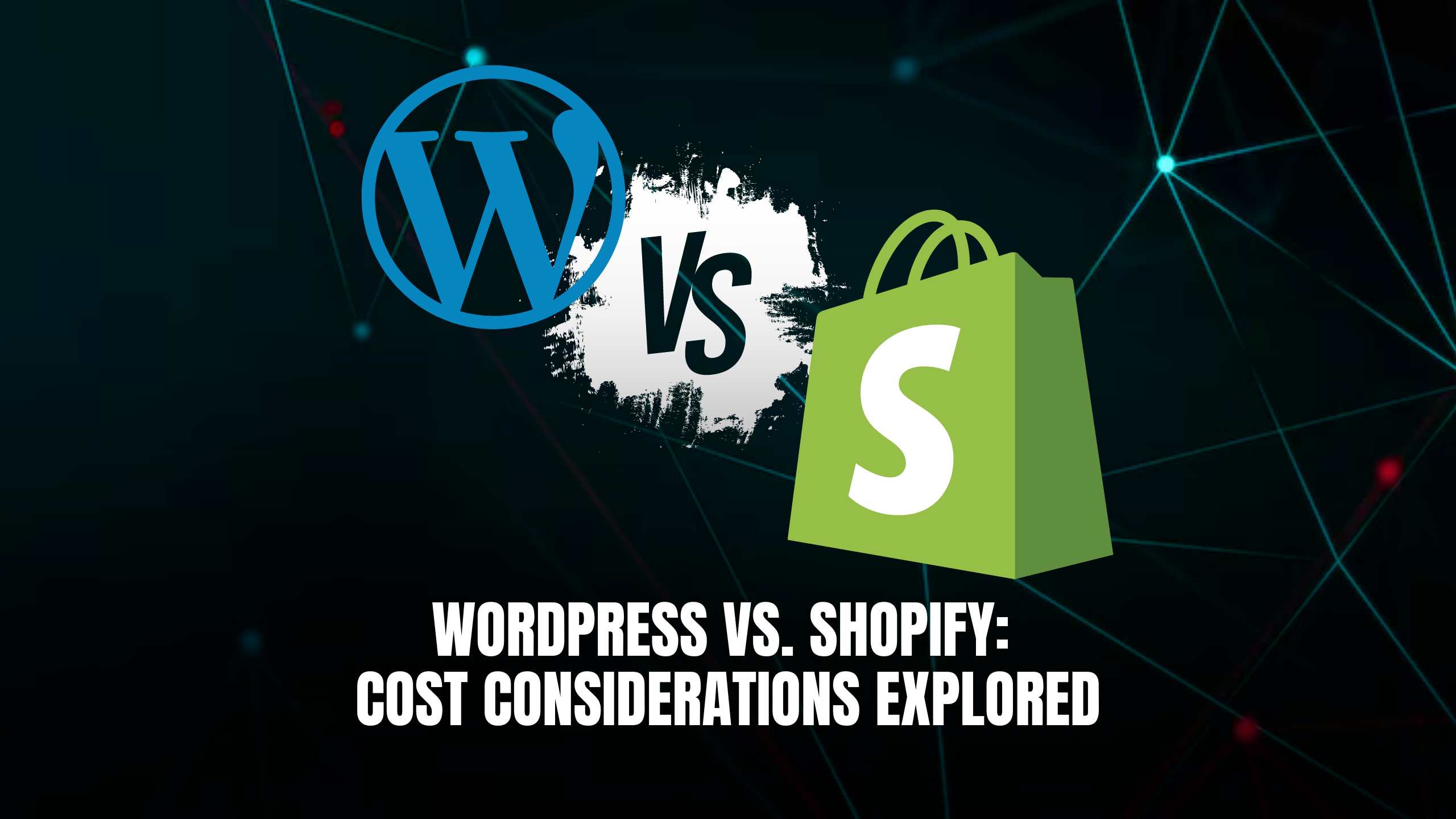WordPress vs. Shopify: Cost Considerations Explored


WordPress vs. Shopify: Cost Considerations Explored
When it comes to launching an online store or website, choosing the right platform is crucial for success. WordPress and Shopify are two of the most popular options, each offering unique features and functionalities. In this blog, we’ll delve into the cost considerations of WordPress and Shopify to help you make an informed decision for your online venture.
1. Initial Setup Costs
Setting up a website or online store requires initial investment, and the cost varies between WordPress and Shopify. With WordPress, you can opt for a self-hosted solution using WordPress.org, which involves purchasing a domain name and hosting plan. While WordPress itself is free, you may incur expenses for premium themes, plugins, and developer assistance. On the other hand, Shopify offers a subscription-based model, with pricing plans ranging from basic to advanced, encompassing hosting, security, and support within the package.
2. Customization and Scalability
Both WordPress and Shopify offer extensive customization options, but the associated costs differ. With WordPress, you have the flexibility to customize every aspect of your website, including design, functionality, and integrations. However, hiring developers or purchasing premium themes and plugins may incur additional expenses over time. Conversely, Shopify provides a user-friendly interface and a range of built-in features, reducing the need for third-party extensions. While Shopify’s subscription fees may increase as your business scales, the platform offers robust e-commerce solutions and support for growing businesses.
3. Transaction Fees and Payment Gateways
When selling products online, transaction fees and payment gateway charges can impact your bottom line. With WordPress, you have the freedom to choose from various payment gateways and payment processing solutions, but transaction fees may apply depending on the payment provider. Shopify, on the other hand, offers integrated payment gateways with competitive transaction fees, simplifying the payment process for merchants. While Shopify’s transaction fees are transparent, they should be factored into your overall budget when comparing costs between platforms.
4. Maintenance and Security
Maintaining a secure and optimized website requires ongoing investment in maintenance and security measures. With WordPress, you are responsible for managing updates, backups, and security protocols, which may require technical expertise or additional plugins. Conversely, Shopify handles server maintenance, security patches, and updates, offering a hassle-free experience for merchants. While Shopify’s subscription fees include hosting and security, WordPress site owners should budget for ongoing maintenance to ensure optimal performance and protection against cyber threats.
5. Support and Resources
Both WordPress and Shopify offer extensive support resources, but the level of assistance may vary. WordPress boasts a vast community of developers, forums, and documentation, providing access to free resources and tutorials. Additionally, premium support services and developer assistance are available for a fee. Shopify provides 24/7 customer support via live chat, email, and phone, ensuring merchants have access to assistance whenever they need it. While WordPress offers a wealth of free resources, Shopify’s dedicated support may be advantageous for businesses seeking immediate assistance and guidance.
Recommended Saas Products:
- WooCommerce: As a plugin for WordPress, WooCommerce offers a powerful and customizable e-commerce solution, seamlessly integrating with your WordPress website to create a robust online store.
- Shopify Apps: Shopify’s extensive app marketplace provides access to a wide range of tools and integrations to enhance your online store’s functionality, from marketing and SEO to inventory management and customer support.
- WP Rocket: Improve the performance and speed of your WordPress website with WP Rocket, a caching plugin that optimizes page loading times, ultimately enhancing user experience and SEO rankings.
- ReCharge: For subscription-based businesses, ReCharge offers a subscription management platform that integrates seamlessly with Shopify, providing tools for recurring billing, subscription analytics, and customer retention.
- Klaviyo: Drive sales and engagement with Klaviyo, an email marketing platform that integrates with both WordPress and Shopify, allowing you to create personalized email campaigns, automate workflows, and track performance metrics.
Conclusion
In conclusion, the cost considerations between WordPress and Shopify extend beyond initial setup fees to encompass long-term expenses, transaction fees, maintenance, and support. While WordPress offers flexibility and customization options, Shopify provides a comprehensive e-commerce solution with integrated features and support. Ultimately, the choice between WordPress and Shopify depends on your budget, business goals, and specific requirements.
Maximize Your Online Venture with Subscribed.fyi!
Ready to launch your online store or website? Subscribed.fyi offers exclusive deals on essential SaaS tools for website development and e-commerce. Unlock free member-only deals and access savings on top WordPress themes, Shopify apps, and other essential resources. Sign up for free today and start maximizing your online venture with Subscribed.fyi!
Relevant Links:








